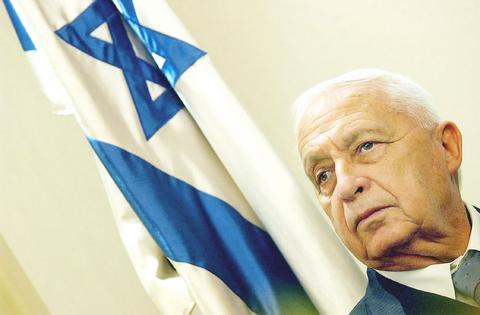Israeli Prime Minister Ariel Sharon on Sunday abandoned a planned trip to the US this week. During a bruising Cabinet session, he also insisted that he would draw up a new plan to withdraw from settlements in the Gaza Strip and the West Bank regardless of his defeat by members of his Likud party in a referendum.
Sharon's office said the prime minister would be too busy to travel to the US, where he was to address the pro-Israel lobby group, the American Israeli Public Affairs Committee, and meet the president.
Sharon gave no hint of what his revised proposal might include, but said it would be released in three weeks after consultations with ministers.

PHOTO: REUTERS
His disengagement plan and his defeat in the referendum nine days ago have exposed rifts in the Cabinet, underlined on Sunday when ministers stormed out of the meeting.
Justice Minister Tommy Lapid said that he and his fellow ministers from the Shinui party would resign from the government unless Sharon introduced a new plan.
Avigdor Lieberman and Benny Elon, the rightwing ministers of transport and tourism respectively, walked out of the meeting in protest at the discussion on withdrawal from settlements.
Ministers from Sharon's Likud party also showed uneasiness with the prime minister's direction. Minister without Portfolio Uzi Landau said it was undemocratic to continue discussing settlement withdrawal after Likud had rejected it. Finance Minister Binyamin Netanyahu, a potential rival to Sharon as party leader, urged the prime minister to respect the decision of the party. Sharon held a private meeting with Netanyahu to work out an alternative disengagement plan but the pair could not agree.
Netanyahu and Limor Livnat, the education minister, and Silvan Shalom, the foreign minister, betrayed Sharon by agreeing to back his plan but then refusing to campaign for him, a major factor in his defeat.
At the meeting, Netanyahu told the prime minister that three weeks was not enough time to come up with a proper alternative. He said the Likud poll "is binding for all Likud members, including the prime minister."
Netanyahu said most Likud members would be prepared to make concessions, but not in the midst of terror, Israel Radio reported.
Tommy Lapid, who called for the Cabinet discussion, said a new plan should include the renewal of peace talks with the Palestinians.
"We can't now say, `That's it, they rejected the disengagement plan, we're done, everything is as it was' -- in opposition to the American position, in opposition to the European position, in opposition to the Arab world, in opposition to most of the Israeli public."
Ehud Olmert, the deputy prime minister, said he respected the members of the Likud party but did not believe the referendum result accurately reflected their beliefs.
"I'm not sure that the result reflects the decisive portion of Likud members," he told Israel Radio, citing the voter turnout of about 50 percent.
He told the Cabinet that the results indicate the government must present alternatives.
He also said the disengagement issue would be brought before the Cabinet.
"At some point, there will certainly be a discussion in the government," he said.
While Israeli ministers try to work out their position, there are signs that the Palestinian prime minister, Ahmed Qureia, who has been sidelined by Sharon's recent proposals, might play a greater role in negotiations.
Condoleezza Rice, the US national security adviser, is due to meet him next week in Germany and Bush said he would write to Qureia to underline that the US still supported the road map.
The rapprochement with Qureia comes after a bad month for American-Arab relations with revelations of US troops torturing Iraqis and the president seeming to give Israel his strongest public demonstration of support by saying that the US recognized large settlement blocks in the West Bank and Palestinians should not have the right to return to homes lost in Israel in 1948.

The death of a former head of China’s one-child policy has been met not by tributes, but by castigation of the abandoned policy on social media this week. State media praised Peng Peiyun (彭珮雲), former head of China’s National Family Planning Commission from 1988 to 1998, as “an outstanding leader” in her work related to women and children. The reaction on Chinese social media to Peng’s death in Beijing on Sunday, just shy of her 96th birthday, was less positive. “Those children who were lost, naked, are waiting for you over there” in the afterlife, one person posted on China’s Sina Weibo platform. China’s

‘NO COUNTRY BUMPKIN’: The judge rejected arguments that former prime minister Najib Razak was an unwitting victim, saying Najib took steps to protect his position Imprisoned former Malaysian prime minister Najib Razak was yesterday convicted, following a corruption trial tied to multibillion-dollar looting of the 1Malaysia Development Berhad (1MDB) state investment fund. The nation’s high court found Najib, 72, guilty on four counts of abuse of power and 21 charges of money laundering related to more than US$700 million channeled into his personal bank accounts from the 1MDB fund. Najib denied any wrongdoing, and maintained the funds were a political donation from Saudi Arabia and that he had been misled by rogue financiers led by businessman Low Taek Jho. Low, thought to be the scandal’s mastermind, remains

Australian Prime Minister Anthony Albanese yesterday announced plans for a national bravery award to recognize civilians and first responders who confronted “the worst of evil” during an anti-Semitic terror attack that left 15 dead and has cast a heavy shadow over the nation’s holiday season. Albanese said he plans to establish a special honors system for those who placed themselves in harm’s way to help during the attack on a beachside Hanukkah celebration, like Ahmed al-Ahmed, a Syrian-Australian Muslim who disarmed one of the assailants before being wounded himself. Sajid Akram, who was killed by police during the Dec. 14 attack, and

VISHNU VANDALS: A Cambodian official accused Thailand of destroying a statue in a disputed border area, with video showing the Hindu structure being torn down The Thai military said ceasefire talks with Cambodia, set to begin yesterday, are expected to conclude with a meeting of the countries’ defense ministers on Saturday, as the two sides seek to end weeks of deadly clashes. The talks started at 4pm in Thailand’s Chanthaburi Province, which borders Cambodia. The Thai Ministry of Defense outlined several demands to be discussed ahead of the bilateral meeting of the General Border Committee (GBC) on Saturday. If secretariat-level discussions fail to reach agreement on key technical frameworks such as troop deployments, the Thai side would not proceed with the GBC meeting or sign any agreement on